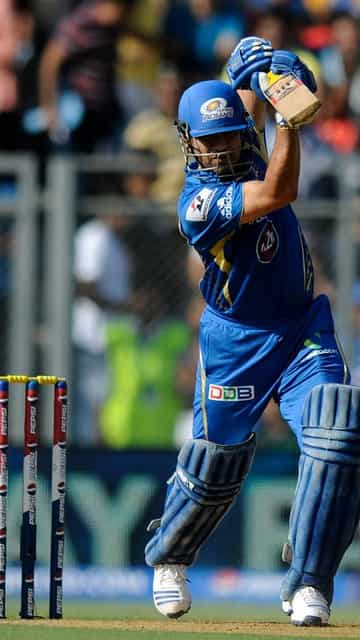The Australian Rugby Union must protect the nation's five Super Rugby teams even if it means forging a new competition with sides from New Zealand and Asia and limiting South Africa's involvement, former ARU Chairman Peter McGrath has told Reuters.
The Australian Rugby Union must protect the nation's five Super Rugby teams even if it means forging a new competition with sides from New Zealand and Asia and limiting South Africa's involvement, former ARU Chairman Peter McGrath has told Reuters.
During his tenure from 2007-12, McGrath oversaw the introduction of Australia's fifth side, the Melbourne Rebels, into Super Rugby in 2011, five years after Perth-based Western Force joined the tournament.
Neither of the expansion sides have made the playoffs and have proved a heavy financial burden for the ARU.
Super Rugby's governing body SANZAAR has flagged changes to the competition's unwieldy 18-team format but kept them under wraps pending 'final consultations' with stakeholders, prompting speculation that at least one Australian team could be cut.
Prominent former Wallabies players and media pundits have argued that Australia has neither the funds nor the depth of talent to field five teams, but McGrath said turning back the clock was not the answer.
"I think it's absolutely fundamental that we keep five teams and the ARU should be ensuring that," the Canberra-based lawyer told Reuters in an interview.
"I disagree totally that we don't have enough talent. I believe we do have enough talent.
"People need to take a back seat and ask 'What's in the best interests of Australian rugby?' The other (SANZAAR) unions from New Zealand, South Africa and Argentina will be doing exactly the same."
The Super Rugby competition, which was already a sprawling tournament of long-haul flights between South Africa and Australia and New Zealand, grew even bigger last year with new teams from Japan and Argentina coming on board.
The shake-up also included the introduction of a confusing conference system that critics have blamed for lowering the standard of competition.
ALARM BELLS
McGrath said that if Australia could not afford five teams in the current format it should set up a new tournament with New Zealand and Asian sides in a more friendly timezone and only involve South African teams during the playoffs.
It might mean forgoing some broadcast dollars due to South Africa's reduced involvement but the cost savings would make it viable, said the 62-year-old.
"There was some work done on that, as far back as 2009," McGrath said, referring to a study.
"While the revenue was definitely down, costs were dramatically down.
"My understanding was that it would be quite viable. With Asian teams in the mix, even more so."
Since the Sydney-based New South Wales Waratahs won the 2014 title, the Australian conference has struggled to match the dominant New Zealand sides in recent seasons.
The gap between the nations has never been more glaring, with Australia holding a 0-11 record against New Zealand opponents over the six weeks of the current season.
McGrath, a former chairman of the Canberra-based ACT Brumbies during their championship winning days in 2001 and 2004, rejected the idea that Australia lacked the talent to compete with New Zealand and felt the current struggles were cyclical to some extent.
"These things come and go. It wasn't that long ago that people were saying there are too many New Zealand provinces in the competition," he said.
"There was always one franchise over there that was struggling."
But he admitted the gap would be ringing alarm bells in ARU headquarters, while the Australian teams' failure to win or even play an "attractive" brand of rugby would hardly attract new fans in a crowded sport market dominated by rugby league and the indigenous Australian Rules football.
There would also be no quick fix to turning Australia's fortunes around but pointing fingers at the weaker expansion sides would do little to help the cause.
"Of course (the critics) would be happy if we kept just New South Wales and Queensland, wouldn't they?" he said.
"That's how they work. Honestly, let's move forward instead of backwards. The bottom line is we've got five teams.
"And they can't retain the same level of funding from the broadcaster with less product.
"If we want to be competitive, ultimately we have to work together."
(This article has not been edited by DNA's editorial team and is auto-generated from an agency feed.)
![submenu-img]() US imposes sanctions on Chinese, Belarus firms for providing ballistic missile tech to Pakistan
US imposes sanctions on Chinese, Belarus firms for providing ballistic missile tech to Pakistan![submenu-img]() 'Don't have any comment': White House mum on reports of Israeli strikes in Iran
'Don't have any comment': White House mum on reports of Israeli strikes in Iran![submenu-img]() Yes Bank co-founder Rana Kapoor gets bail after four years in bank fraud case
Yes Bank co-founder Rana Kapoor gets bail after four years in bank fraud case![submenu-img]() Barmer Lok Sabha Polls 2024: Check key candidates, date of voting and other important details
Barmer Lok Sabha Polls 2024: Check key candidates, date of voting and other important details![submenu-img]() This star once lived in garage, earned Rs 51 as first salary; now charges Rs 5 crore per film, is worth Rs 335 crore
This star once lived in garage, earned Rs 51 as first salary; now charges Rs 5 crore per film, is worth Rs 335 crore![submenu-img]() DNA Verified: Is CAA an anti-Muslim law? Centre terms news report as 'misleading'
DNA Verified: Is CAA an anti-Muslim law? Centre terms news report as 'misleading'![submenu-img]() DNA Verified: Lok Sabha Elections 2024 to be held on April 19? Know truth behind viral message
DNA Verified: Lok Sabha Elections 2024 to be held on April 19? Know truth behind viral message![submenu-img]() DNA Verified: Modi govt giving students free laptops under 'One Student One Laptop' scheme? Know truth here
DNA Verified: Modi govt giving students free laptops under 'One Student One Laptop' scheme? Know truth here![submenu-img]() DNA Verified: Shah Rukh Khan denies reports of his role in release of India's naval officers from Qatar
DNA Verified: Shah Rukh Khan denies reports of his role in release of India's naval officers from Qatar![submenu-img]() DNA Verified: Is govt providing Rs 1.6 lakh benefit to girls under PM Ladli Laxmi Yojana? Know truth
DNA Verified: Is govt providing Rs 1.6 lakh benefit to girls under PM Ladli Laxmi Yojana? Know truth![submenu-img]() Remember Ali Haji? Aamir Khan, Kajol's son in Fanaa, who is now director, writer; here's how charming he looks now
Remember Ali Haji? Aamir Khan, Kajol's son in Fanaa, who is now director, writer; here's how charming he looks now![submenu-img]() Remember Sana Saeed? SRK's daughter in Kuch Kuch Hota Hai, here's how she looks after 26 years, she's dating..
Remember Sana Saeed? SRK's daughter in Kuch Kuch Hota Hai, here's how she looks after 26 years, she's dating..![submenu-img]() In pics: Rajinikanth, Kamal Haasan, Mani Ratnam, Suriya attend S Shankar's daughter Aishwarya's star-studded wedding
In pics: Rajinikanth, Kamal Haasan, Mani Ratnam, Suriya attend S Shankar's daughter Aishwarya's star-studded wedding![submenu-img]() In pics: Sanya Malhotra attends opening of school for neurodivergent individuals to mark World Autism Month
In pics: Sanya Malhotra attends opening of school for neurodivergent individuals to mark World Autism Month![submenu-img]() Remember Jibraan Khan? Shah Rukh's son in Kabhi Khushi Kabhie Gham, who worked in Brahmastra; here’s how he looks now
Remember Jibraan Khan? Shah Rukh's son in Kabhi Khushi Kabhie Gham, who worked in Brahmastra; here’s how he looks now![submenu-img]() DNA Explainer: What is cloud seeding which is blamed for wreaking havoc in Dubai?
DNA Explainer: What is cloud seeding which is blamed for wreaking havoc in Dubai?![submenu-img]() DNA Explainer: What is Israel's Arrow-3 defence system used to intercept Iran's missile attack?
DNA Explainer: What is Israel's Arrow-3 defence system used to intercept Iran's missile attack?![submenu-img]() DNA Explainer: How Iranian projectiles failed to breach iron-clad Israeli air defence
DNA Explainer: How Iranian projectiles failed to breach iron-clad Israeli air defence![submenu-img]() DNA Explainer: What is India's stand amid Iran-Israel conflict?
DNA Explainer: What is India's stand amid Iran-Israel conflict?![submenu-img]() DNA Explainer: Why Iran attacked Israel with hundreds of drones, missiles
DNA Explainer: Why Iran attacked Israel with hundreds of drones, missiles![submenu-img]() This star once lived in garage, earned Rs 51 as first salary; now charges Rs 5 crore per film, is worth Rs 335 crore
This star once lived in garage, earned Rs 51 as first salary; now charges Rs 5 crore per film, is worth Rs 335 crore![submenu-img]() Meet actress, who worked as cook for free food, mopped floors, one Instagram post changed her life, is now worth…
Meet actress, who worked as cook for free food, mopped floors, one Instagram post changed her life, is now worth… ![submenu-img]() UP man arrested for booking cab from Salman Khan's house under Lawrence Bishnoi's name
UP man arrested for booking cab from Salman Khan's house under Lawrence Bishnoi's name ![submenu-img]() 'Justice milega': Ankita Lokhande talks about Sushant Singh Rajput, reveals she's still connected with his family
'Justice milega': Ankita Lokhande talks about Sushant Singh Rajput, reveals she's still connected with his family![submenu-img]() Rajkummar Rao reacts to plastic surgery rumours, admits he got fillers: 'If something gives me confidence...'
Rajkummar Rao reacts to plastic surgery rumours, admits he got fillers: 'If something gives me confidence...'![submenu-img]() IPL 2024: KL Rahul, Quinton de Kock star in Lucknow Super Giants' dominating 8-wicket win over Chennai Super Kings
IPL 2024: KL Rahul, Quinton de Kock star in Lucknow Super Giants' dominating 8-wicket win over Chennai Super Kings![submenu-img]() DC vs SRH, IPL 2024: Predicted playing XI, live streaming details, weather and pitch report
DC vs SRH, IPL 2024: Predicted playing XI, live streaming details, weather and pitch report![submenu-img]() Watch: Virat Kohli's cheeky 'your wife' remark to Dinesh Karthik leaves RCB teammates in splits
Watch: Virat Kohli's cheeky 'your wife' remark to Dinesh Karthik leaves RCB teammates in splits ![submenu-img]() DC vs SRH IPL 2024 Dream11 prediction: Fantasy cricket tips for Delhi Capitals vs Sunrisers Hyderabad
DC vs SRH IPL 2024 Dream11 prediction: Fantasy cricket tips for Delhi Capitals vs Sunrisers Hyderabad![submenu-img]() 'Kohli said it's not an option, just...': KL Rahul recalls his IPL debut for RCB in 2013
'Kohli said it's not an option, just...': KL Rahul recalls his IPL debut for RCB in 2013![submenu-img]() Canada's biggest heist: Two Indian-origin men among six arrested for Rs 1300 crore cash, gold theft
Canada's biggest heist: Two Indian-origin men among six arrested for Rs 1300 crore cash, gold theft![submenu-img]() Donuru Ananya Reddy, who secured AIR 3 in UPSC CSE 2023, calls Virat Kohli her inspiration, says…
Donuru Ananya Reddy, who secured AIR 3 in UPSC CSE 2023, calls Virat Kohli her inspiration, says…![submenu-img]() Nestle getting children addicted to sugar, Cerelac contains 3 grams of sugar per serving in India but not in…
Nestle getting children addicted to sugar, Cerelac contains 3 grams of sugar per serving in India but not in…![submenu-img]() Viral video: Woman enters crowded Delhi bus wearing bikini, makes obscene gesture at passenger, watch
Viral video: Woman enters crowded Delhi bus wearing bikini, makes obscene gesture at passenger, watch![submenu-img]() This Swiss Alps wedding outshine Mukesh Ambani's son Anant Ambani's Jamnagar pre-wedding gala
This Swiss Alps wedding outshine Mukesh Ambani's son Anant Ambani's Jamnagar pre-wedding gala













































)
)
)
)
)
)